from
Rail Splitter Pin
-
Full Title
Silk Ribbon with Lincoln Photograph and Rail Splitter Pin
-
Description
This ribbon, which features a small, framed photograph of Abraham Lincoln and a bronze rail splitter pin, may have been worn in support during presidential campaigns and in mourning during the President’s funeral procession. Lincoln’s funeral procession began in Washington, DC, on April 20, 1865. The train carrying Lincoln’s body stopped in Baltimore, MD, and Harrisburg, PA, before arriving in Philadelphia on April 22. The body lay in state at Independence Hall and was open for public viewing on April 23. The funeral train departed from Philadelphia for New York City at 4:00 a.m. on April 24.
-
Source
The Abraham Lincoln Foundation of The Union League of Philadelphia (Object ID: 1972.200.3)
-
Rights
Use of this item for research, teaching and private study is permitted with proper citation and attribution, as “Courtesy of The Abraham Lincoln Foundation of The Union League of Philadelphia.” Reproduction of this item for publication, broadcast or commercial use requires written permission. For permission, please contact The Abraham Lincoln Foundation.
-
Tags
-
Cite this Item
Unknown. "Silk Ribbon with Lincoln Photograph and Rail Splitter Pin". Remembering Lincoln. Web. Accessed June 15, 2025. https://rememberinglincoln.fords.org/node/896
from
Silk Ribbon with Lincoln Photograph and Rail Splitter Pin

-
Description
This ribbon, which features a small, framed photograph of Abraham Lincoln and a bronze rail splitter pin, may have been worn in support during presidential campaigns and in mourning during the President’s funeral procession. Lincoln’s funeral procession began in Washington, DC, on April 20, 1865. The train carrying Lincoln’s body stopped in Baltimore, MD, and Harrisburg, PA, before arriving in Philadelphia on April 22. The body lay in state at Independence Hall and was open for public viewing on April 23. The funeral train departed from Philadelphia for New York City at 4:00 a.m. on April 24.
-
Source
The Abraham Lincoln Foundation of The Union League of Philadelphia (Object ID: 1972.200.3)
-
Rights
Use of this item for research, teaching and private study is permitted with proper citation and attribution, as “Courtesy of The Abraham Lincoln Foundation of The Union League of Philadelphia.” Reproduction of this item for publication, broadcast or commercial use requires written permission. For permission, please contact The Abraham Lincoln Foundation.
-
Creator
Unknown
-
Material
Silk, copper, brass, and paper
-
Dimensions
8.75 x 0.75
from
Framed Mourning Badge
-
Full Title
Copper Framed Photograph Badge with Ribbon
-
Description
This small, framed photograph of Abraham Lincoln may have been worn by supporters during presidential campaigns and mourning during the President’s funeral procession. The funeral procession began in Washington, DC, on April 20, 1865. The train carrying Lincoln’s body stopped in Baltimore, MD, and Harrisburg, PA, before arriving in Philadelphia on April 22. The body lay in state at Independence Hall and was open for public viewing on April 23. The funeral train departed from Philadelphia for New York City at 4:00 a.m. on April 24.
-
Source
The Abraham Lincoln Foundation of The Union League of Philadelphia (Object ID: 1972.200.2)
-
Rights
Use of this item for research, teaching and private study is permitted with proper citation and attribution, as “Courtesy of The Abraham Lincoln Foundation of The Union League of Philadelphia.” Reproduction of this item for publication, broadcast or commercial use requires written permission. For permission, please contact The Abraham Lincoln Foundation.
-
Tags
-
Cite this Item
Unknown. "Copper Framed Photograph Badge with Ribbon". Remembering Lincoln. Web. Accessed June 15, 2025. https://rememberinglincoln.fords.org/node/895
from
Copper Framed Photograph Badge with Ribbon
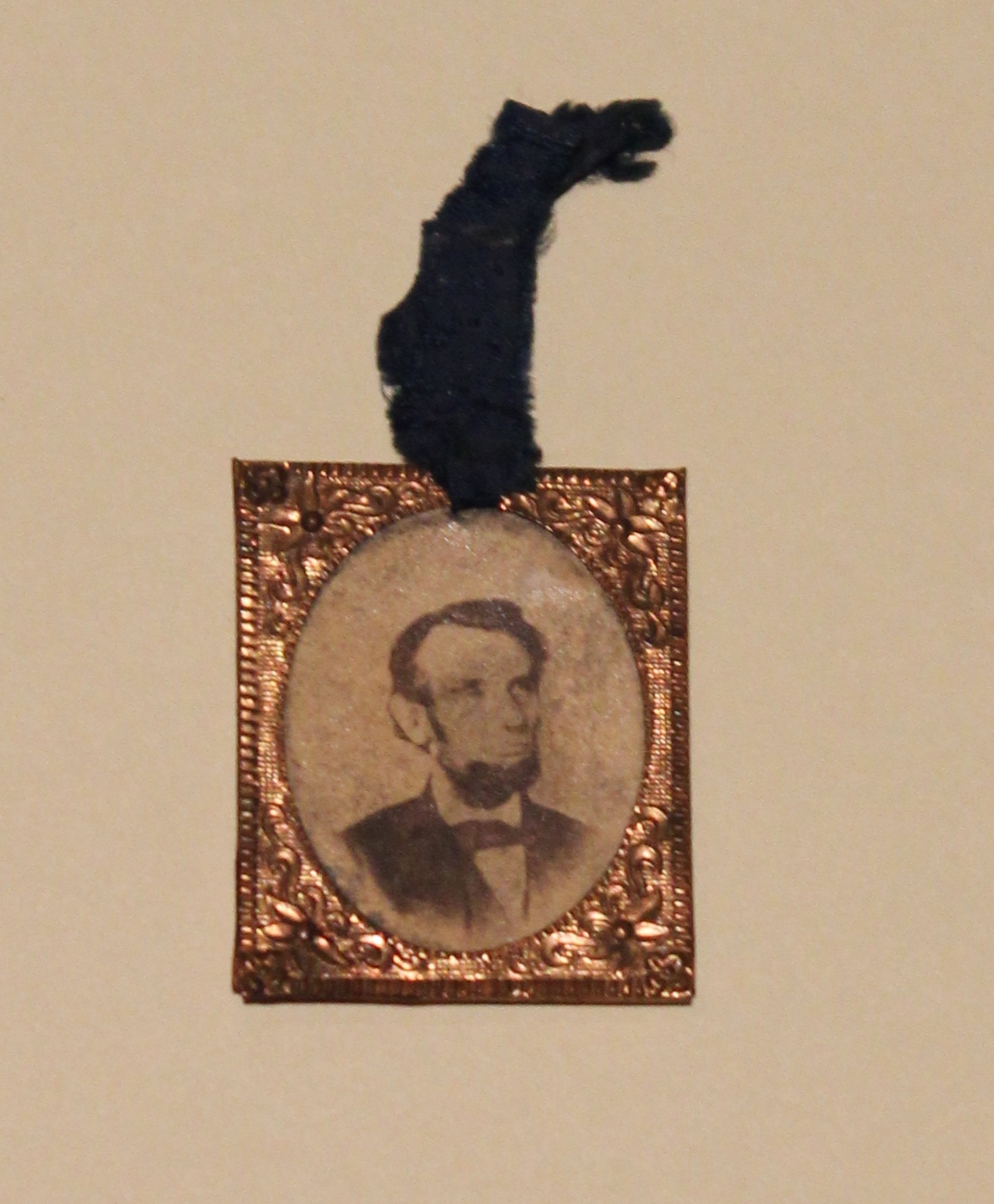
-
Description
This small, framed photograph of Abraham Lincoln may have been worn by supporters during presidential campaigns and mourning during the President’s funeral procession. The funeral procession began in Washington, DC, on April 20, 1865. The train carrying Lincoln’s body stopped in Baltimore, MD, and Harrisburg, PA, before arriving in Philadelphia on April 22. The body lay in state at Independence Hall and was open for public viewing on April 23. The funeral train departed from Philadelphia for New York City at 4:00 a.m. on April 24.
-
Source
The Abraham Lincoln Foundation of The Union League of Philadelphia (Object ID: 1972.200.2)
-
Rights
Use of this item for research, teaching and private study is permitted with proper citation and attribution, as “Courtesy of The Abraham Lincoln Foundation of The Union League of Philadelphia.” Reproduction of this item for publication, broadcast or commercial use requires written permission. For permission, please contact The Abraham Lincoln Foundation.
-
Creator
Unknown
-
Material
Copper, silk, paper
-
Dimensions
2.25 x 1.0
from
Mourning Ribbon with Shield
-
Full Title
Mourning Ribbon with Shield and Photographic Portrait of Lincoln
-
Description
This mourning ribbon includes an embroidered shield along with a framed photograph of President Lincoln. The ribbon was worn by mourners who visited President Lincoln’s funeral in Philadelphia, Pennsylvania. Lincoln’s funeral procession began in Washington, DC, on April 20, 1865. The train carrying Lincoln’s body stopped in Baltimore, MD, and Harrisburg, PA, before arriving in Philadelphia on April 22. The body lay in state at Independence Hall and was open for public viewing on April 23. The funeral train departed from Philadelphia for New York City at 4:00 a.m. on April 24.
-
Source
The Abraham Lincoln Foundation of The Union Leage of Philadelphia (Object ID: 2001.238.3)
-
Rights
Use of this item for research, teaching and private study is permitted with proper citation and attribution, as “Courtesy of The Abraham Lincoln Foundation of The Union League of Philadelphia.” Reproduction of this item for publication, broadcast or commercial use requires written permission. For permission, please contact The>The Abraham Lincoln Foundation.
-
Tags
-
Cite this Item
Unknown. "Mourning Ribbon with Shield and Photographic Portrait of Lincoln". Remembering Lincoln. Web. Accessed June 15, 2025. https://rememberinglincoln.fords.org/node/893
from
Mourning Ribbon with Shield and Photographic Portrait of Lincoln

-
Description
This mourning ribbon includes an embroidered shield along with a framed photograph of President Lincoln. The ribbon was worn by mourners who visited President Lincoln’s funeral in Philadelphia, Pennsylvania. Lincoln’s funeral procession began in Washington, DC, on April 20, 1865. The train carrying Lincoln’s body stopped in Baltimore, MD, and Harrisburg, PA, before arriving in Philadelphia on April 22. The body lay in state at Independence Hall and was open for public viewing on April 23. The funeral train departed from Philadelphia for New York City at 4:00 a.m. on April 24.
-
Source
The Abraham Lincoln Foundation of The Union Leage of Philadelphia (Object ID: 2001.238.3)
-
Rights
Use of this item for research, teaching and private study is permitted with proper citation and attribution, as “Courtesy of The Abraham Lincoln Foundation of The Union League of Philadelphia.” Reproduction of this item for publication, broadcast or commercial use requires written permission. For permission, please contact The>The Abraham Lincoln Foundation.
-
Creator
Unknown
-
Material
Silk, copper, paper
-
Dimensions
4.25 x 0.75
from
Philadelphia Police Ribbon
-
Full Title
Philadelphia Police Mourning Ribbon
-
Description
This mourning badge was worn by Mr. Godfrey Stringer when President Lincoln’s body lay in state in Philadelphia, PA. Lincoln’s body was brought to Philadelphia on April 22, 1865. The object includes a cardboard police badge covered in black gauze and black silk ribbon. Below the black cinched ribbon, there is a white silk ribbon that reads, “We Mourn Our Nation’s Loss. Born February 12th, 1809, Died April 17th 1865.” Notice the incorrect date listed for the President's death.
-
Transcription
We Mourn Our Nation’s Loss.
Born February 12th, 1809
Died April 17th 1865. -
Source
The Abraham Lincoln Foundation of The Union League of Philadelphia (Object ID: 2001.240.1)
-
Rights
Use of this item for research, teaching and private study is permitted with proper citation and attribution, as “Courtesy of The Abraham Lincoln Foundation of The Union League of Philadelphia.” Reproduction of this item for publication, broadcast or commercial use requires written permission. For permission, please contact The Abraham Lincoln Foundation.
-
Tags
-
Cite this Item
Unknown. "Philadelphia Police Mourning Ribbon". Remembering Lincoln. Web. Accessed June 15, 2025. https://rememberinglincoln.fords.org/node/891
from
Philadelphia Police Mourning Ribbon

-
Description
This mourning badge was worn by Mr. Godfrey Stringer when President Lincoln’s body lay in state in Philadelphia, PA. Lincoln’s body was brought to Philadelphia on April 22, 1865. The object includes a cardboard police badge covered in black gauze and black silk ribbon. Below the black cinched ribbon, there is a white silk ribbon that reads, “We Mourn Our Nation’s Loss. Born February 12th, 1809, Died April 17th 1865.” Notice the incorrect date listed for the President's death.
-
Source
The Abraham Lincoln Foundation of The Union League of Philadelphia (Object ID: 2001.240.1)
-
Rights
Use of this item for research, teaching and private study is permitted with proper citation and attribution, as “Courtesy of The Abraham Lincoln Foundation of The Union League of Philadelphia.” Reproduction of this item for publication, broadcast or commercial use requires written permission. For permission, please contact The Abraham Lincoln Foundation.
-
Creator
Unknown
-
Material
Cardboard, gauze, silk, paper
-
Dimensions
9.25 x 3.75
from May. 1, 1865
Mourning Pin with Lincoln's Portrait
-
Full Title
Mourning Pin with Lincoln's Portrait
-
Description
President Andrew Johnson declared June 1, 1865, to be a “national day of fasting and prayer.” People all over the country collected souvenir memorabilia, like this mourning pin, as a way to take part in the observances.
-
Source
-
Rights
This item is in the public domain and may be reproduced and used for any purpose, including research, teaching, private study, publication, broadcast or commercial use, with proper citation and attribution.
-
Tags
-
Cite this Item
unknown. "Mourning Pin with Lincoln's Portrait". Remembering Lincoln. Web. Accessed June 15, 2025. https://rememberinglincoln.fords.org/node/883
-
Creator
unknown
-
Date
1865
from May. 1, 1865
Mourning Pin with Lincoln's Portrait
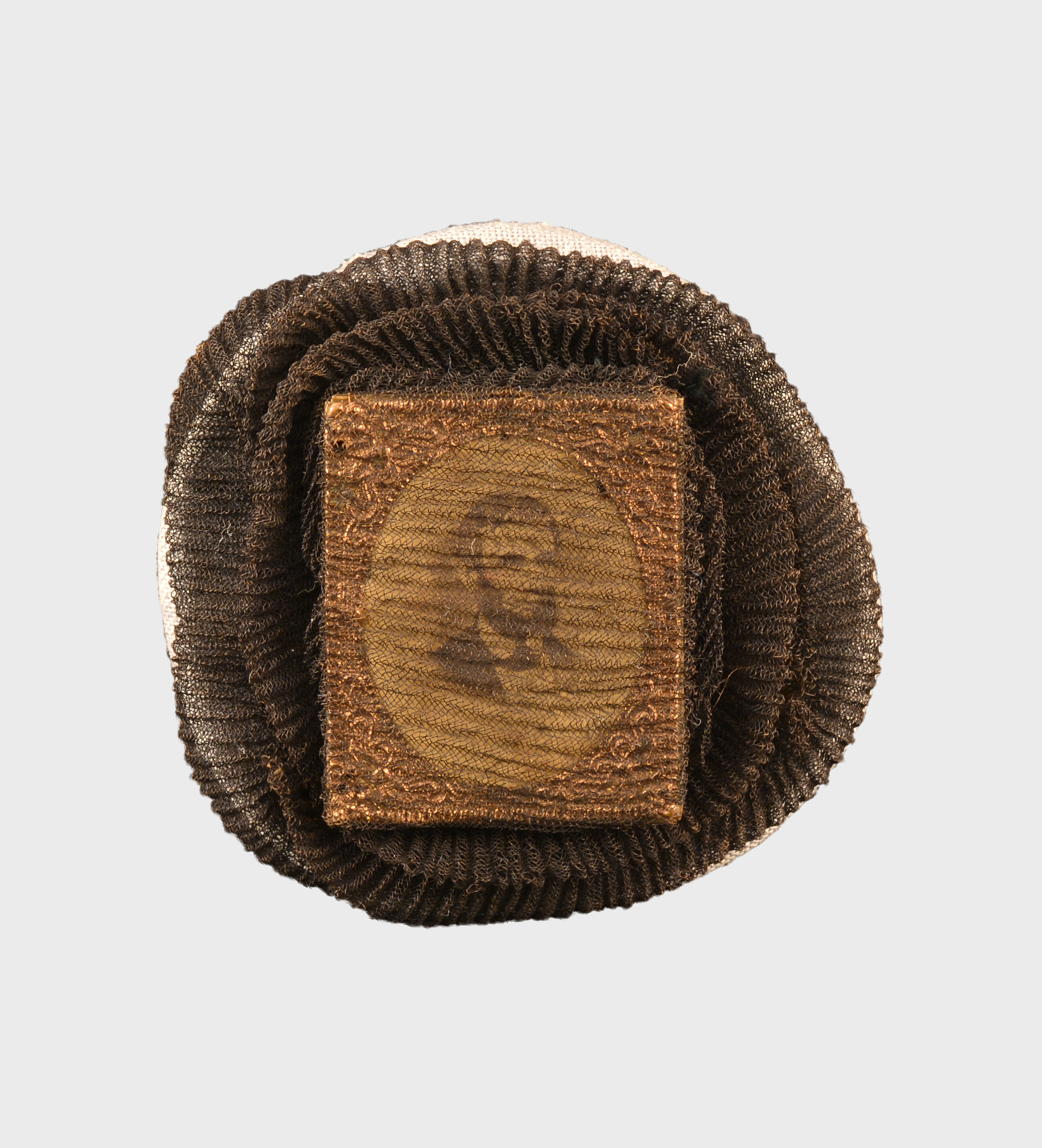
-
Description
President Andrew Johnson declared June 1, 1865, to be a “national day of fasting and prayer.” People all over the country collected souvenir memorabilia, like this mourning pin, as a way to take part in the observances.
-
Source
-
Rights
This item is in the public domain and may be reproduced and used for any purpose, including research, teaching, private study, publication, broadcast or commercial use, with proper citation and attribution.
-
Creator
unknown
-
Date
May 1, 1865
from May. 1, 1865
"We Mourn His Loss"
-
Full Title
"We Mourn His Loss"
-
Description
President Andrew Johnson declared June 1, 1865, to be a “national day of fasting and prayer.” People all over the country collected souvenir memorabilia, like this mourning ribbon, as a way to take part in the observances.
-
Source
-
Rights
This item is in the public domain and may be reproduced and used for any purpose, including research, teaching, private study, publication, broadcast or commercial use, with proper citation and attribution.
-
Tags
-
Cite this Item
unknown. ""We Mourn His Loss"". Remembering Lincoln. Web. Accessed June 15, 2025. https://rememberinglincoln.fords.org/node/881
-
Creator
unknown
-
Date
1865
from May. 1, 1865
"We Mourn His Loss"
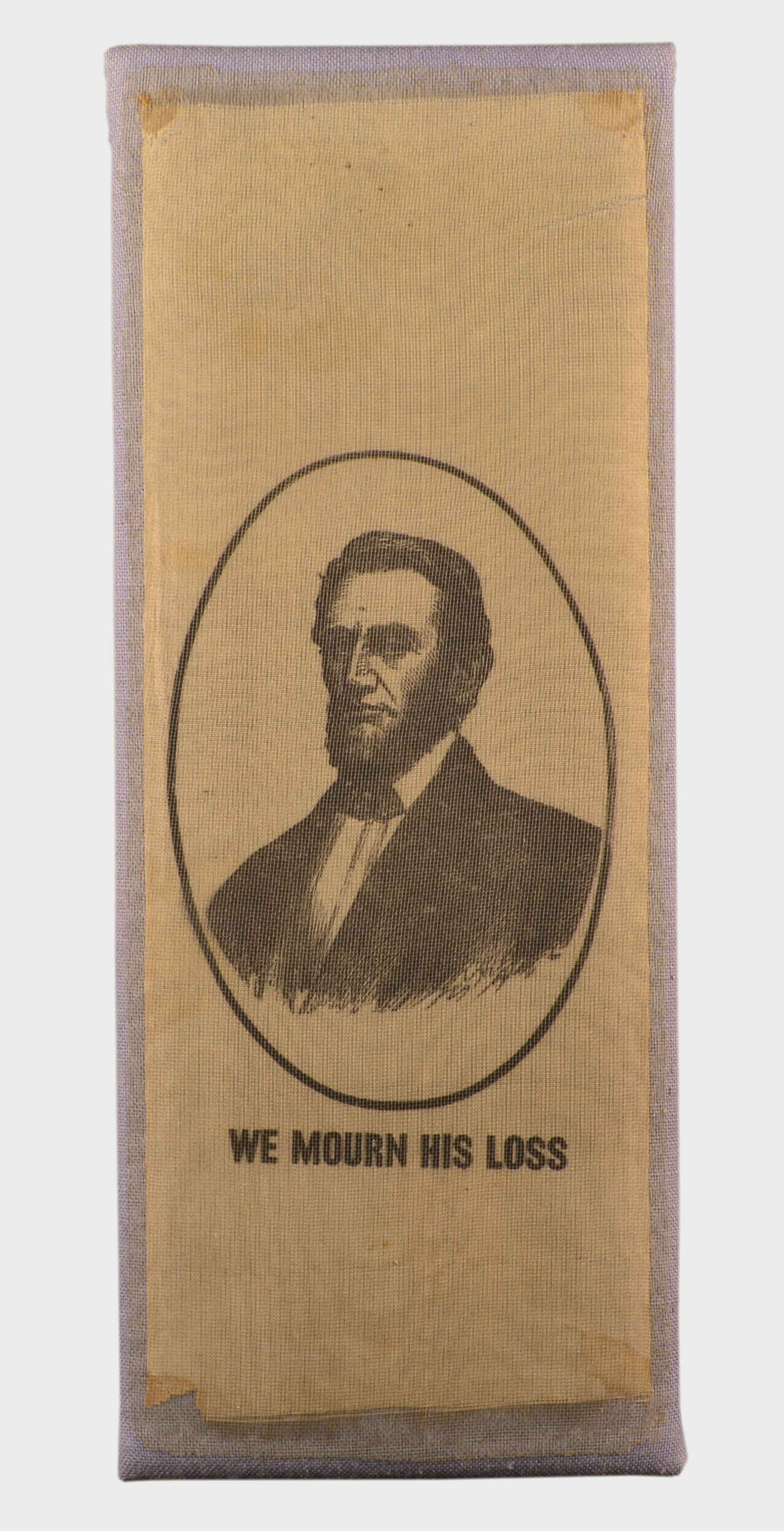
-
Description
President Andrew Johnson declared June 1, 1865, to be a “national day of fasting and prayer.” People all over the country collected souvenir memorabilia, like this mourning ribbon, as a way to take part in the observances.
-
Source
-
Rights
This item is in the public domain and may be reproduced and used for any purpose, including research, teaching, private study, publication, broadcast or commercial use, with proper citation and attribution.
-
Creator
unknown
-
Date
May 1, 1865
from May. 1, 1865
Mourning Ribbon with American Flags
-
Full Title
Mourning Ribbon with American Flags
-
Description
President Andrew Johnson declared June 1, 1865, to be a “national day of fasting and prayer.” People all over the country collected souvenir memorabilia, like this mourning ribbon, as a way to take part in the observances.
-
Source
-
Rights
This item is in the public domain and may be reproduced and used for any purpose, including research, teaching, private study, publication, broadcast or commercial use, with proper citation and attribution.
-
Tags
-
Cite this Item
unknown. "Mourning Ribbon with American Flags". Remembering Lincoln. Web. Accessed June 15, 2025. https://rememberinglincoln.fords.org/node/877
-
Creator
unknown
-
Date
1865
from May. 1, 1865
Mourning Ribbon with American Flags
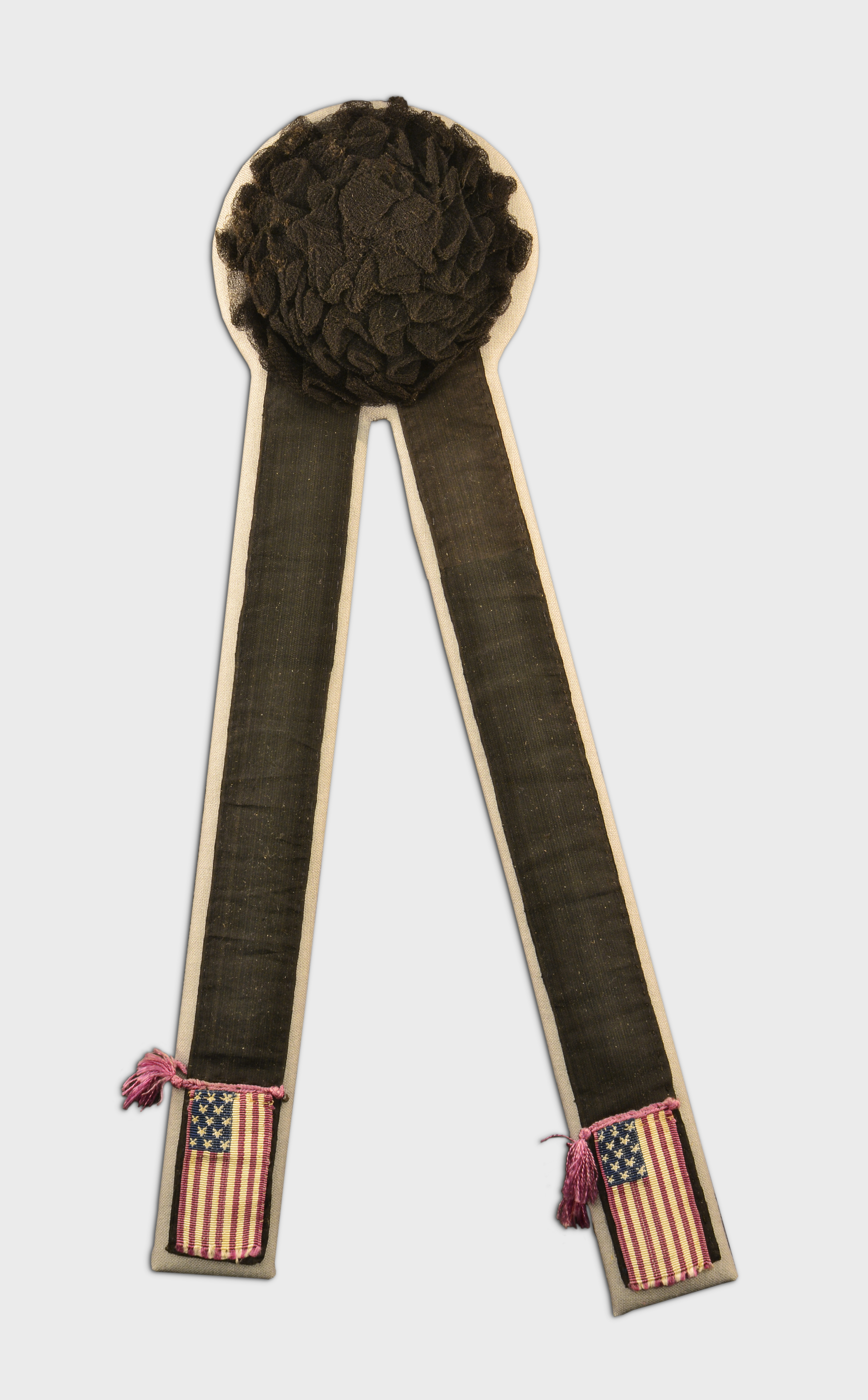
-
Description
President Andrew Johnson declared June 1, 1865, to be a “national day of fasting and prayer.” People all over the country collected souvenir memorabilia, like this mourning ribbon, as a way to take part in the observances.
-
Source
-
Rights
This item is in the public domain and may be reproduced and used for any purpose, including research, teaching, private study, publication, broadcast or commercial use, with proper citation and attribution.
-
Creator
unknown
-
Date
May 1, 1865
from May. 1, 1865
"This Flag Must be Upheld"
-
Full Title
"This Flag Must be Upheld"
-
Description
President Andrew Johnson declared June 1, 1865, to be a “national day of fasting and prayer.” People all over the country collected souvenir memorabilia, like this mourning ribbon, as a way to take part in the observances.
-
Source
-
Rights
This item is in the public domain and may be reproduced and used for any purpose, including research, teaching, private study, publication, broadcast or commercial use, with proper citation and attribution.
-
Tags
-
Cite this Item
Unknown. ""This Flag Must be Upheld"". Remembering Lincoln. Web. Accessed June 15, 2025. https://rememberinglincoln.fords.org/node/872
-
Creator
Unknown
-
Date
1865
from May. 1, 1865
"This Flag Must be Upheld"
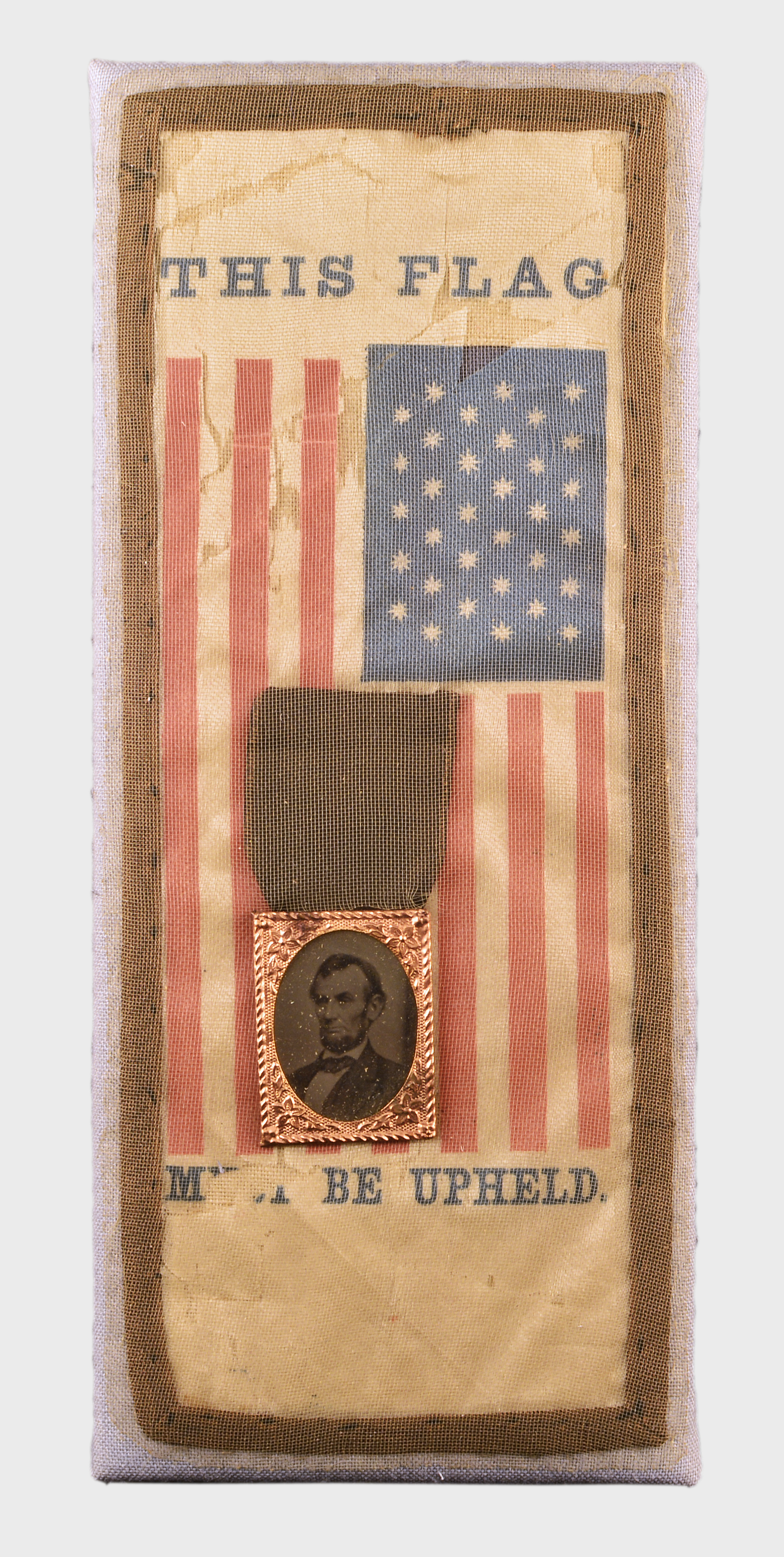
-
Description
President Andrew Johnson declared June 1, 1865, to be a “national day of fasting and prayer.” People all over the country collected souvenir memorabilia, like this mourning ribbon, as a way to take part in the observances.
-
Source
-
Rights
This item is in the public domain and may be reproduced and used for any purpose, including research, teaching, private study, publication, broadcast or commercial use, with proper citation and attribution.
-
Creator
Unknown
-
Date
May 1, 1865
from Apr. 19, 1865
Charles A. Jewell to Parents
-
Full Title
Charles A. Jewell
-
Description
Charles Adolphus Jewell II was born September 8, 1839 near East Jaffray, New Hampshire. In 1842, the family migrated to southern Michigan, settling near the town of Lime Creek. Charles later attended the newly formed Michigan Agricultural College, and in 1862, was a member of the second graduating class. Shortly thereafter, he joined the Union Army, serving in the 18th Michigan Volunteer Regiment until July,1865. Jewell describes the public mourning of Lincoln in Huntsville, Alabama, and the sorrow felt by the Union soldiers. He then discusses his involvement in violent retribution exacted upon anyone accused of celebrating the assassination. Jewell recounts an evening when Union soldiers patrolled the streets for "demonstrations of joy" and upon hearing such an act, tracked the supposed perpetrator to the home of a wealthy man. The soldiers broke in and threatened to kill the man, but he convinced them he said nothing against Lincoln. Jewell notes that a feeling of fear is palpable among Confederate sympathizers because they are afraid that African Americans working in their home may turn them in to Union authorities, but he also acknowledges that many southerners express grief over Lincoln's death because he was a relatively moderate politician. Then, Jewell details the funeral procession and his belief that the assassination has reinvigorated morale among overworked, underpaid Union soldiers.
-
Transcription
[Written sideways across top of page]
letter by the last mail that came through, from Jimmy. He was, and had been well,
We anxiously hope to see
those boys back with us
very soon. Churchill from Medina is here
and assigned to Co.
K. We have one recruit
from Monroe Co.
Those who ran away from
the draft will feel mean
enough now that the
recruiting is stopped.
They ought to be held
in deep disgrace by all,
hereforth. The Col.
Doolittle has not got
his Commission yet.
so Horner Hulburd and
Hinkly cannot muster
Cap Babcock has gone home,
Love to all
Charles
PS I forgot to say that my
money is almost all
gone. And no signs of
Pay-master, if [illegible in original]
is [illegible in original] still, or any body
else, please send me
$25.00 and if you don’t
get another letter
with news from the Pay master
within a week from the time
you get this, and no oppor
tunity offers of sending other
wise, please send the same by mail.
Charles
[End]
Huntsville Ala
April 19th 1865
Dearest Parents:
The mail is finally through
again, after long long days of waiting and
I have got the earnestly looked for letter from
you. The bridges have been on
both roads between here and Nashville
and we have had no news-absolutely
nothing – except the very little by telegraph.
What doleful times! For three days, we
have mourned the death of that great
good man, Abraham Lincoln.
The deep mouthed cannon have boomed
the bells have tolled, the Band has played
his funeral dirge. The soldiers are
heart-broken, I can scarcely repress tears
of grief as I write. We trusted him with
the implicit faith of a father. We knew he
was the soldier’s truest friend. Every thing
seemed confused-lost-bewildered, and the
nation like an orphan child.
[Written upside down on first lines of page]
The Detroit Tribune came this morning and I was very much pleased
to see the article on the Agricultural College. It seemed to be progressing finely.
[End]
Indignation knew no bounds. Men of
great temperament- Christians, -men of no
passionate character- all soldiers, were ready
to sacrifice the life and property of any who
showed by word or deed, any signs of joy.
We would have burned that town I verily believe
I would not have hesitated to shoot any citizens
or burn any dwelling, had I heard murder
and treason, combined, from any lips. I was
never so exasperated. Officers and men paraded
the streets – I might say patroled- armed; on
purpose to spy out any demonstrations of joy.
In the dim twilight- A voice was heard to execrate
his name and express joy at his death. The soldiers
rushed for the man- they thought they tracked him
to a splendid residence! they threw open the doors,
seized a man –who was sitting, reading, by the
hair, brandishing their bayonets, and some
shouting “kill him” ! but they dragged him to
the light – and became convinced he was not the
man. He says he fully expected to die, for a
few moments. The citizens are trembling, They
don’t know but their negroes may have over
heard some word of joy. Most of the really intelligent
citizens are far from joyous, for they see plainly
how the bloody – dastardly act has widened, deepened
the abyss between the Northern masses, and the
Southern fire-eaters. They see that unless peace is
hastily made now – no mercy can be expected.
We will burn, pillage, annihilate if necessary- but
such a red-bloody- dastardly, political party must
not live in these U.S. Should the news reach Sherman
on the eve of a battle with Johnson, what earthly power
could stop them- they would show no mercy!
The procession here yesterday was the most
solemn I ever witnessed! The whole military force
was out marching in open order- with arms
reversed, and with slow and solemn tread,
keeping time to the sweet- tho mournful- deeply
sadly mournful music of the Band, And the
deep-toned cannon-every half-hour thundered
forth something of the fierce-determined, spirit of
vengeance, that filled the hardened breasts of those
who had witnessed many scenes before, that stir
men’s souls. Yet I never saw such terrible feeling.
It was not the noisy, frothy [ebullitious?] that broke forth
when Sumpter fell, nor yet the common sorrow that
all felt at Bull Run. It was like the silent heaving
of the volcano. Men who have been waiting so patient
ly for these expirations of their term of service, whom no money can
hire to reenlist, who spurn the price of a substitute – said in
a subdued tone – low but terrible – between their teeth- “I” am
ready to re-enlist as long as any murderers are left.” and they
would have done it. The feeling is universal. Men who
have not supported the President feel as deeply as we, who do. &
have. It was a foul stab at the Nation’s honor!
We don’t get news from Johnson & Sherman – indeed get no
papers, yet. By telegraph, we learn that Mobile is ours. –and from
the rebels that Forrest is badly defeated. How can the war last?
If we must devastate the whole South, and exterminate the
whole population of fire-eaters give us the word, and we will
form a skirmish line, and burn the country. But who is
to ‘give the word’? – Alas! our Commander in Chief –our
beloved leader is no more and who is left that can so
well, bring peace to us? God grant that this mantle may
fall upon his successor. He has nothing of the natural
ability of Abraham Lincoln.
Andrew has just arrived and has been in to see me. He
left the sugar which is delicious and means much more
to me than the mere gratification of appetite. It assures me
that “they miss me at home.” God bless you all, for your
love, and thoughtfulness of me. I do not know how Will
feels but I think he has given up the Regular Army, and
I do not see any opportunity for myself, tho I am still of
the opinion, that, should an opportunity occur, of joining with
my present rank, it would be the best opening for me.
I should be continually miserable in the neighborhood
of soldiers if I were not with them. The drills, the music,
the marching, the very buttons of the uniform are dear to me,
and I feel such thrills of pride, sometimes, on parade
and marching, and guard-mountings! as I never expect
to feel from any other employment. But I expect to give it
up, and be a farmer. My name has gone forward for
promotion to the 1st Let. I was not consulted – I am not aware
that any influence was exerted with the Col. since the Adju
-nct says he simply stated the facts to him. I am to go in
ahead of Lee-Baron. The prospect of a speedy closing of the war
induced me to let the thing run tho I didn’t know of it till the
recommendation was mailed, to the A.G. of Mich. My com
-mission has not arrived. You are entirely mistaken, my
dearest mother, in regard to my health. – I was never in better health. X
the reason you have not heard from me, is partly because we have
been off on a number of Raids (which I have not had room to recount)
and then because the mail has been stopped by the floods. If the mails
are only regular, I will try to write as often as once each week. I got only
your letter tonight- but it was I wished most to see. I read a
[letter continues to left side Scan 1]
-
Source
UA.10.3.5 - Charles A. Jewell II Papers
-
Rights
Educational use only, no other permissions given. Copyright to this resource is held by Michigan State University and is provided here for educational purposes only. It may not be reproduced or distributed in any format without written permission of the University Archives & Historical Collections, Michigan State University.
-
Tags
-
Cite this Item
Charles Adolphus Jewell II. "Charles A. Jewell". Michigan State University Archives & Historical Collections. Remembering Lincoln. Web. Accessed June 15, 2025. https://rememberinglincoln.fords.org/node/869
-
Creator
Charles Adolphus Jewell II
-
Publisher
Michigan State University Archives & Historical Collections
-
Date
April 19, 1865
-
Material
Ink and Paper
-
Dimensions
8" x 10"
from Apr. 19, 1865
Charles A. Jewell

-
Description
Charles Adolphus Jewell II was born September 8, 1839 near East Jaffray, New Hampshire. In 1842, the family migrated to southern Michigan, settling near the town of Lime Creek. Charles later attended the newly formed Michigan Agricultural College, and in 1862, was a member of the second graduating class. Shortly thereafter, he joined the Union Army, serving in the 18th Michigan Volunteer Regiment until July,1865. Jewell describes the public mourning of Lincoln in Huntsville, Alabama, and the sorrow felt by the Union soldiers. He then discusses his involvement in violent retribution exacted upon anyone accused of celebrating the assassination. Jewell recounts an evening when Union soldiers patrolled the streets for "demonstrations of joy" and upon hearing such an act, tracked the supposed perpetrator to the home of a wealthy man. The soldiers broke in and threatened to kill the man, but he convinced them he said nothing against Lincoln. Jewell notes that a feeling of fear is palpable among Confederate sympathizers because they are afraid that African Americans working in their home may turn them in to Union authorities, but he also acknowledges that many southerners express grief over Lincoln's death because he was a relatively moderate politician. Then, Jewell details the funeral procession and his belief that the assassination has reinvigorated morale among overworked, underpaid Union soldiers.
-
Source
UA.10.3.5 - Charles A. Jewell II Papers
-
Rights
Educational use only, no other permissions given. Copyright to this resource is held by Michigan State University and is provided here for educational purposes only. It may not be reproduced or distributed in any format without written permission of the University Archives & Historical Collections, Michigan State University.
-
Creator
Charles Adolphus Jewell II
-
Publisher
Michigan State University Archives & Historical Collections
-
Date
April 19, 1865
-
Material
Ink and Paper
-
Dimensions
8" x 10"
from Apr. 14, 1865
O.H. Bronson
-
Full Title
O.H. Bronson
-
Description
O.H. Bronson, a business person located in the Hartford, CT area, mentions the death of Lincoln briefly in excerpts from their diary entry on April 14, 1865. They make further references to the stabbing of Lincoln's Secretary of State Seward and church services being held to mourn and commemorate Lincoln's life in the Hartford area. The diary also notes that businesses would be closed for mourning the following day.
-
Transcription
Monday, April 1, 1865
Celebration of the Sunday of [[?]] and his day
Tuesday 11
Sent? to capt. Clarke $2,50
Paid
Henry started for the [[?]] the every 7.0 [[?]]
Wednesday 12
Rainy [[?]] [[?]]
played at house last night.
Thursday, April 13, 1865
Offered Frank [[?]]
Stock in ground
For 10 [[?]] at note
3 months
Friday 14
Abraham Lincoln President
Of United States was
assassinated in theater
this evening
Secretary Stewart
was also stabbed in the
neck 3 times but it
hoped not mortally
his son [[?]] [[?]]
were stabbed.
Saturday 15
Johnny Gains
per day 300 meal 300
Sunday, April 16, 1865
Mr Parker redeemed
[[?]] on the death of
President Lincoln this eve.
Monday 17
Sold LB goodmaid 1/4 [[?]]
[[?]], he claimed 40 lb short
weighed the coal 23 1/4 pails
21 1/4 each 21 1/4
___________
23.
466.
5
_________lbs
49.4
[[?]] went to
New York this day
As book keeper in [[?]] bank
Tuesday 18
( scribble)
Wednesday, April 19, 1865
All the offices and many
of business closed from
12 to 3 o'clock on [[?]]
Of funeral of president Lincoln
received in the different
[[?]] at 12 o'clock
most of the [[?]]
in city [[?]] in morning
Thursday 20 [[?]]
Cargo of coal
for 6 B Jammer to go the
[[?]] retreat for sets
[[?]]
Friday 21
Samuel Clark [[?]]
To take [[?]] Made
From first of May
At $10 for each horse
Rcpt. [[?]] at
You'd pay as the as he [[?]]
[[?]]
[Transcription Team: Ryan P., Kenzie B., Brooke B., Madison R.]
[New Hampton Middle School, New Hampton, Iowa] -
Source
Ms 90282
-
Rights
Use of item for research, teaching and private study is permitted with proper citation and attribution to the Connecticut Historical Society. Reproduction of this item for publication, broadcast or commercial use requires permission. For permission, please contact the Connecticut Historical Society. chs.org/research/digital-reproductions.
-
Tags
-
Cite this Item
O.H. Bronson. "O.H. Bronson". Remembering Lincoln. Web. Accessed June 15, 2025. https://rememberinglincoln.fords.org/node/868
from Apr. 14, 1865
O.H. Bronson
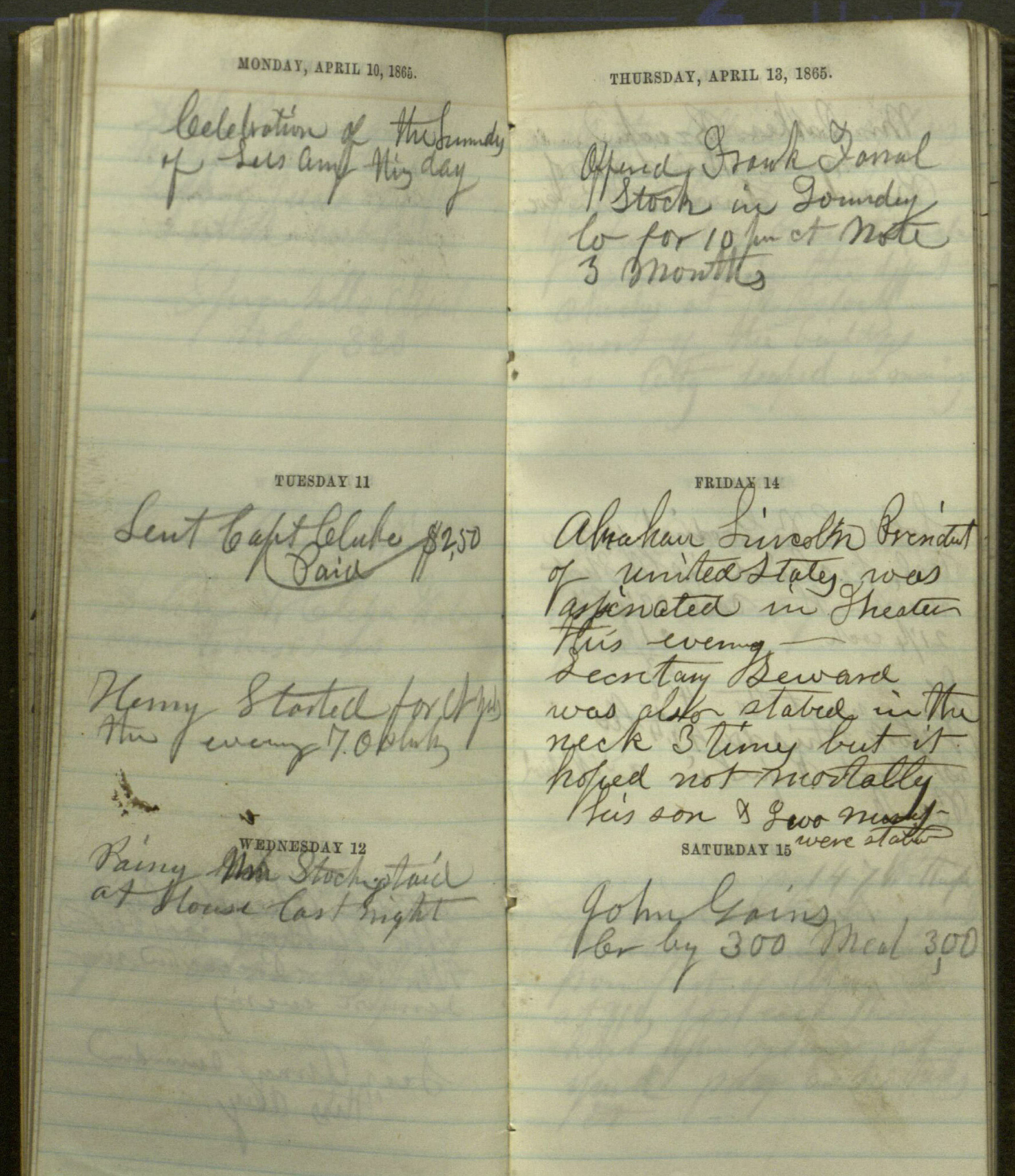
-
Description
O.H. Bronson, a business person located in the Hartford, CT area, mentions the death of Lincoln briefly in excerpts from their diary entry on April 14, 1865. They make further references to the stabbing of Lincoln's Secretary of State Seward and church services being held to mourn and commemorate Lincoln's life in the Hartford area. The diary also notes that businesses would be closed for mourning the following day.
-
Source
Ms 90282
-
Rights
Use of item for research, teaching and private study is permitted with proper citation and attribution to the Connecticut Historical Society. Reproduction of this item for publication, broadcast or commercial use requires permission. For permission, please contact the Connecticut Historical Society. chs.org/research/digital-reproductions.
-
Creator
O.H. Bronson
-
Date
April 14, 1865
-
Material
bound paper with script in ink and type
-
Dimensions
8cm x 17.5cm

